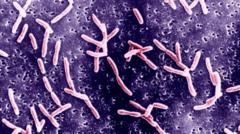Pune, India, is currently facing a concerning outbreak of Guillain-Barré Syndrome (GBS), with around 160 reported cases and multiple suspected fatalities. Health officials trace the outbreak to the foodborne pathogen campylobacter jejuni, raising alarms about public health and safety standards in the region.
India Grapples with Guillain-Barré Syndrome Outbreak Amid Rising Cases

India Grapples with Guillain-Barré Syndrome Outbreak Amid Rising Cases
Over 160 reported cases of Guillain-Barré Syndrome in Pune, linked to a pathogen, prompt health alerts and intensive care measures.
India is currently confronting an alarming outbreak of Guillain-Barré Syndrome (GBS) in Pune, with approximately 160 confirmed cases since January. This rare neurological disorder, characterized by the immune system attacking nerve cells, has manifested severely, leaving some patients in critical condition. One particularly troubling case involved a six-year-old boy whose initial struggle to grip a pencil escalated to total paralysis, requiring ventilator support.
The spike in GBS cases is attributed to the pathogen campylobacter jejuni, mainly linked to foodborne infections. GBS typically presents with symptoms like tingling sensations in extremities, rapid muscle weakness, and can progress to paralysis within weeks. Health experts indicate that mortality rates can range from 3% to 13%, contingent upon the severity of the cases and available healthcare support.
Historically, GBS cases have been documented in India, with noticeable clusters emerging following similar outbreaks in other countries. The Peru government recently declared a national health emergency due to rising GBS incidents linked to campylobacter, underscoring the global pattern of this health crisis.
The link between GBS and campylobacter was identified decades ago, with numerous outbreaks being recorded globally, emphasizing the importance of hygiene and food safety. However, only specific strains of campylobacter are directly associated with GBS—the rare "immunological Russian roulette" where the bacteria's structure conflicts with human nerve cells, leading to identifiable cases of GBS.
In light of the recent surge, Pune health authorities have been proactive, monitoring over 60,000 homes and implementing safety advisories urging citizens to consume only thoroughly prepared food and clean drinking water. Meanwhile, dedicated hospital wards are being established for GBS patients, aimed at providing critical care and treatment.
Despite government measures and health department outreach, public anxiety continues to grow amidst uncertainty over the source of the contamination. As investigations proceed, health officials strive to mitigate risks and reassure the community while providing necessary medical interventions.




















